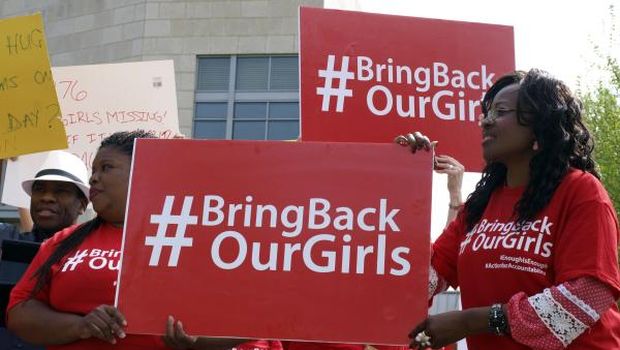#BringBackOurGirls. It is the hashtag that is occupying the entire world right now, emerging on Twitter following the kidnapping of dozens of schoolgirls in Nigeria by Boko Haram militants. The leader of the group vowed to sell the kidnapped girls in a slave market.
The news was shocking, but the initial reaction, especially the Arab and Islamic reaction, did not match the seriousness of the crime.
A few days had passed before the plight of the girls became the focus of public attention. In the last few days attention grew as the popularity of the Twitter hashtag #BringBackOurGirls snowballed, and now the world is interacting electronically and everyone is weighing in.
But can a hashtag bring back the kidnapped girls who have been taken to remote border areas, and when nobody knows for sure what has happened to them?
There is no doubt that the response to militants who kidnap girls from their school because they believe teaching girls is a sin must be decisive, direct and unwavering—but what can an online hashtag campaign do to in the face of such a repulsive and dangerous incident?
The Nigerian authorities are weak, and carry much of the responsibility for the deterioration in the situation and the growth in the strength and influence of Boko Haram. Relying on them to resolve the situation is unwise in this instance.
As for Western governments, they started to move under the pressure of public opinion, with the result that they have offered to send security experts to help the Nigerian authorities deal with the crisis.
The sight of frightened girls in rugged terrain with their murderous captors—compared to the sight of ordinary individuals around the world gathering around their phones or computers, drinking coffee and following the news of the girls’ abduction and weighing in with their opinion through a picture or a comment—seems unequal to the event, and filled with naïveté.
I truly support the campaign and the use of all available means to keep the issue alive in order to secure the return of the girls, but experience tells us that the world’s attention will quickly wane, and the longer the crisis goes on, the more the enthusiasm will diminish, as has happened in many other issues and grievances. An example of this is the world’s current indifference to the Syrian crisis.
In 2012, the world became briefly preoccupied with a social media campaign against Joseph Kony, a guerilla fighter who has committed atrocities in Uganda and neighboring countries. An international campaign was launched against him. Now two years have passed, the campaign has waned, and Kony is still free and committing atrocities as before.
It is likely that Boko Haram will not be affected by the campaign or the hashtag. Its leader—who appears to be insane in the video which showed him laughing and threatening to sell the girls—may even do the unthinkable to his captives.
However, the campaign is directed at governments. Nobody expects selfie photos and hashtags alone to lead to social change, because the only thing that can truly achieve that is government pressure. But governments do listen and act when enough people take a stance.
The power of social media is in participation and continuity, and in the unique gathering of voices from all around the world, which makes it hard to ignore.
So, will the campaign lead to the release of the girls? We can only hope so!
